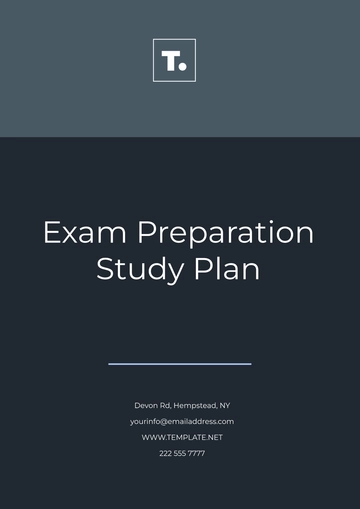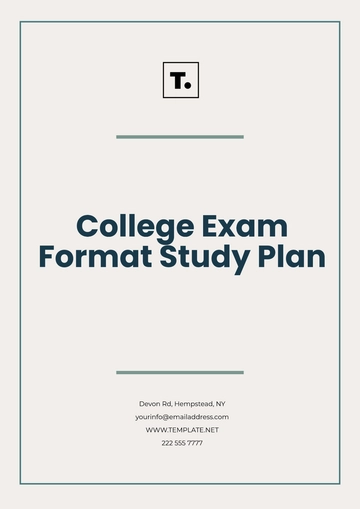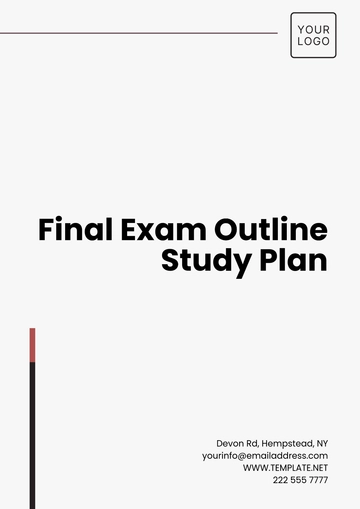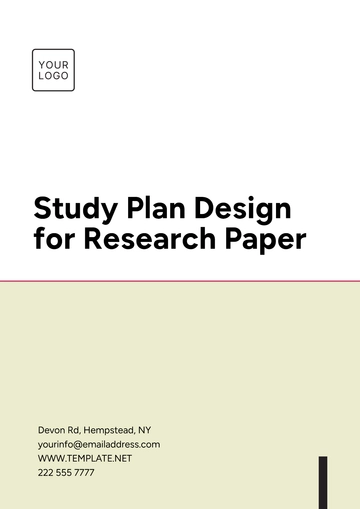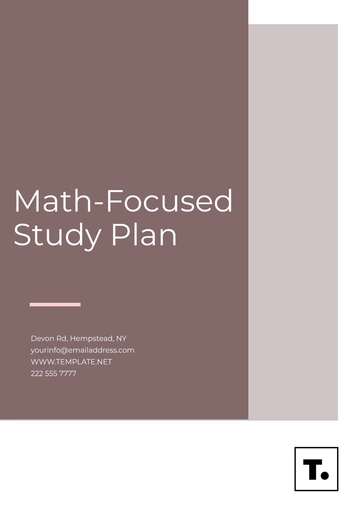Free Weekly Study Plan

Prepared by: | [YOUR NAME] |
School Name: | [YOUR SCHOOL NAME] |
School Address: | [YOUR SCHOOL ADDRESS] |
School Email: | [YOUR SCHOOL EMAIL] |
School Number: | [YOUR SCHOOL NUMBER] |
Website: | [YOUR SCHOOL WEBSITE] |
Social Media: | [YOUR SCHOOL SOCIAL MEDIA] |
I. Overview
This Weekly Study Plan is designed to help [YOUR NAME], a dedicated student, effectively manage study time and ensure academic success. This plan will cover key subjects and topics, include specific academic goals, and account for any special considerations, providing a structured approach to studying.
II. Academic Goals
1. Achieve a minimum grade of A in all subjects:
Assessment: Begin by assessing current grades in all subjects to identify areas needing improvement.
Subject-Specific Goals: Set specific grade targets for each subject, aiming for at least an A.
Study Strategy: Allocate more time to subjects with lower grades, focusing on understanding concepts thoroughly.
Regular Assessment: Schedule regular assessments to track progress and make adjustments to study plans as needed.
2. Master key topics in each subject:
Topic Identification: Identify key topics or concepts within each subject area.
Study Schedule: Allocate dedicated time in the weekly schedule to focus on mastering these topics.
Utilize Resources: Utilize textbooks, online resources, and supplementary materials to deepen understanding.
Practice: Regularly practice problems or exercises related to the key topics to reinforce learning.
3. Develop effective study habits:
Time Management: Implement a study schedule with dedicated time slots for each subject and breaks in between.
Consistency: Commit to consistent study sessions, preferably at the same time each day, to build routine.
Active Learning: Engage in active learning techniques such as summarizing, teaching others, or using mnemonic devices.
Review and Reflection: Regularly review study notes and reflect on learning progress to identify areas for improvement.
4. Manage time efficiently and reduce academic stress:
Prioritization: Prioritize tasks based on urgency and importance, focusing on high-impact activities first.
Breaks and Relaxation: Incorporate short breaks between study sessions to prevent burnout and maintain focus.
Stress Management Techniques: Practice stress-reduction techniques such as deep breathing, mindfulness, or physical activity.
Seek Support: Don't hesitate to seek help from teachers, tutors, or peers if feeling overwhelmed or struggling with any subject.
By implementing these strategies and consistently following the plan, achieving the academic goals of earning minimum A grades in all subjects, mastering key topics, developing effective study habits, and managing time efficiently while reducing academic stress can be attainable.
III. Subjects or Topics Covered
Subject | Topics |
|---|---|
Mathematics | Calculus, Algebra, Statistics |
Science | Physics, Chemistry, Biology |
Literature | English Literature, World Literature |
Social Studies | History, Geography |
Foreign Language | Spanish |
IV. Special Considerations
Allocate extra time for subjects that are found challenging: Identify subjects or topics where additional understanding or practice is needed, and allocate more study time to those areas accordingly. This allows for a deeper comprehension and mastery of challenging concepts.
Include short breaks between study sessions to avoid burnout: Integrate short breaks, such as 5-10 minutes, between study sessions to provide mental rest and prevent burnout. These breaks can involve activities like stretching, walking, or simply relaxing to recharge before the next study session.
Prioritize assignments and projects with imminent deadlines: Identify assignments or projects with upcoming deadlines and prioritize them in the study schedule. Allocating dedicated time to complete these tasks ensures they are completed on time and reduces the stress associated with last-minute rushes.

V. Importance
A structured weekly plan is crucial for:
Organized and efficient studying: With a structured plan, study sessions are well-organized, maximizing productivity and effectiveness.
Academic excellence: The systematic approach of the plan ensures thorough coverage of all topics, leading to better understanding and higher grades.
Balanced life: By accommodating personal and extracurricular activities within the schedule, students can maintain a healthy balance between academics and other interests, fostering overall well-being.
Stress reduction: By avoiding last-minute rushes and spreading out study sessions, the plan helps students manage their workload effectively, reducing stress levels and promoting a more relaxed approach to learning.
VI. Structure of the Plan
The plan is organized into a timetable format.
It covers daily study activities and specific tasks for each day of the week.
Each day focuses on different subjects or topics.
Tasks are allocated to ensure comprehensive coverage of all subjects.
The structure allows for efficient time management and tracking of progress.
Flexibility is built in to adapt the schedule as needed.
Overall, it fosters discipline, consistency, and success in achieving academic goals.
Weekly Study Plan Table
Day | Subject | Topics | Actions |
|---|---|---|---|
Monday | Mathematics | Calculus, Algebra | Review class notes, solve practice problems, revise key formulas |
Tuesday | Science | Physics, Chemistry | Perform lab experiments, read textbook chapters, make summary notes |
Wednesday | Language Arts | English Literature, Essay Writing | Analyze texts, write practice essays, review grammar rules |
Thursday | Social Studies | History, Geography | Read assigned chapters, create timelines, label maps |
Friday | Mathematics | Calculus, Algebra | Complete problem sets, attend study group, consult with tutor |
Saturday | Science | Physics, Chemistry | Review experiment results, solve additional problems, read journals |
Sunday | Free Study/Review | All Subjects | Review notes from the week, prepare for the upcoming week, rest |
VII. Conclusion
[YOUR NAME] must consistently follow the outlined study schedule, making adjustments as needed based on feedback and advancements. Persistent hard work and discipline are crucial for achieving educational goals.
- 100% Customizable, free editor
- Access 1 Million+ Templates, photo’s & graphics
- Download or share as a template
- Click and replace photos, graphics, text, backgrounds
- Resize, crop, AI write & more
- Access advanced editor
Crafted by Template.net, our Weekly Study Plan Template is the ultimate tool for academic success. Fully editable and customizable, it empowers users to tailor their study schedules with ease. With seamless integration into our Ai Editor Tool, organizing your study routine has never been more efficient. Optimize your productivity today!



